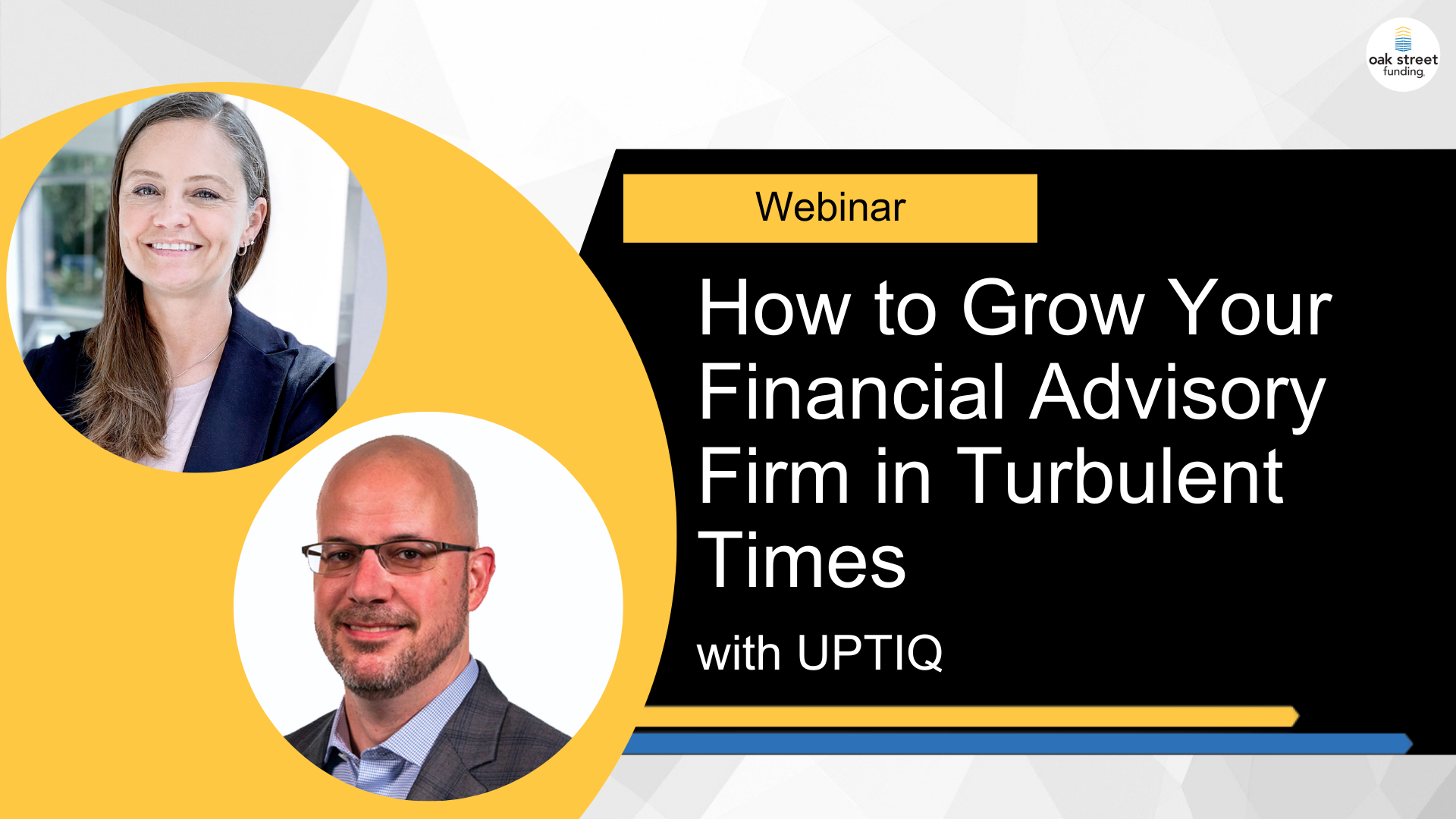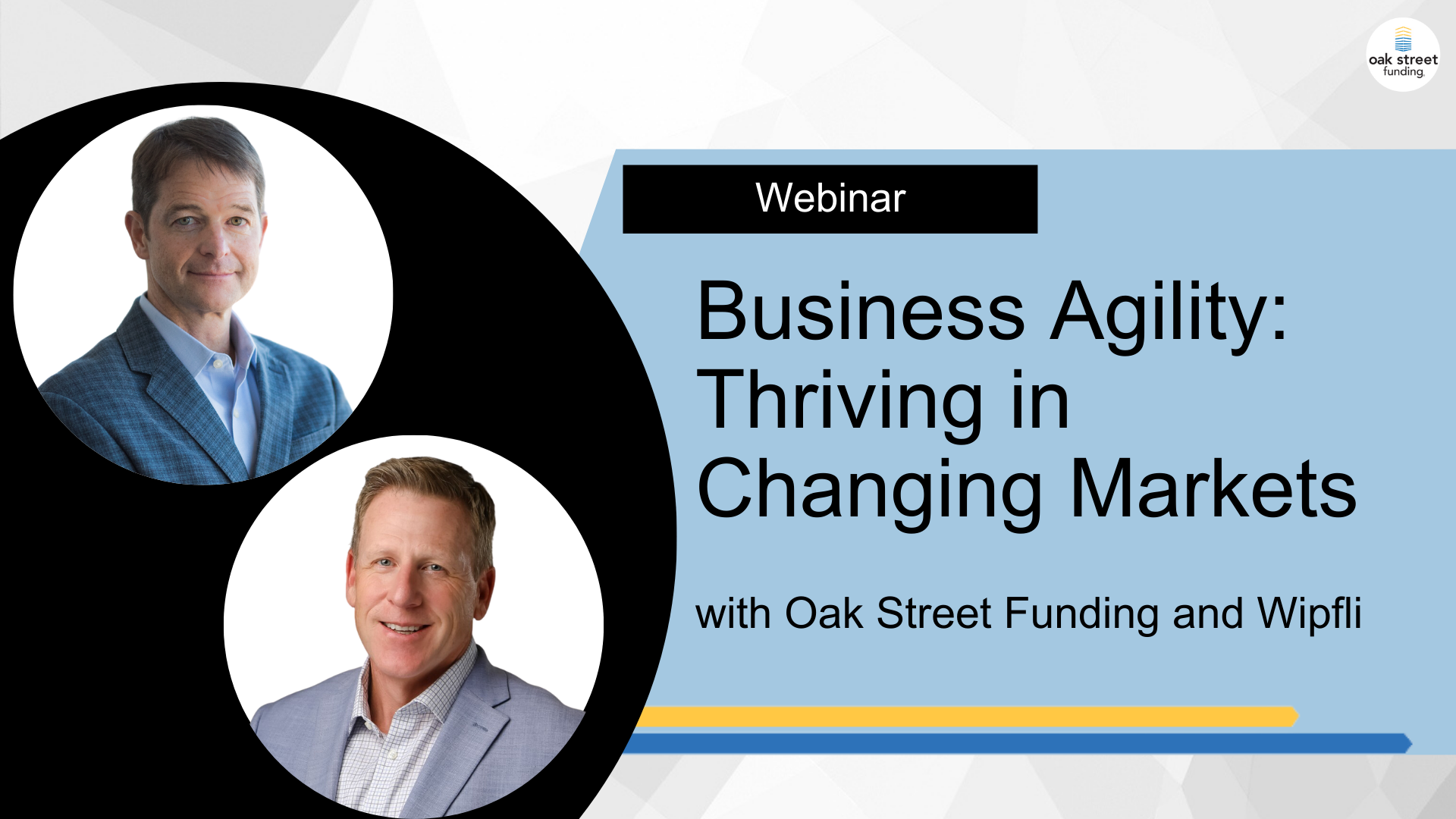How To Grow Your Financial Advisory Firm in Turbulent Times
- 0.5
- 1
- 1.25
- 1.5
- 1.75
- 2
Bridget Haight: Welcome everyone to our webinar on how to grow your financial advisory firm in turbulent times. My name is Bridget Haight. I'm host and moderator for Oak Street Funding Webinars and Podcasts. Today I have Alicia Chandler, President of Oak Street Funding, and Taylor Adkins, Chief Product and Marketing Officer at UPTIQ. They are going to discuss growth during difficult seasons and maintaining that growth mindset throughout the years. Alicia, Taylor, thank you so much for joining me today. To start off, we'll just cover some of the specific challenges facing the financial advisory industry. Alicia, can you start out and tell us what some of the current challenges are?
Alicia Chandler: Sure. So, thanks for having us today. I think right now the continued issues that we see are the advisory space is the need for continued organic growth. I think my watch was spying on me just now. Advisors continue to see their assets under management decline just due to the nature of the stock market. So there was a decline last year and there's been corrections, but with all the ups and downs, there is less assets under management, so the need for organic growth I think has just come to the forefront these days.
Bridget Haight: Right.
Alicia Chandler: In order for organic growth to continue, the advisors are going to have to take a look at a lot of things such as are they going to do cross- marketing to their existing clients? How are they going to add clients? Are they going to try to grow through adding a team or a specific member? Marketing efforts, what are they going to do? And all of these things that they need to really pay attention to. The end result is they need to take money out or borrow money, take money from their accounts, and everything revolves around the need for money for those items.
Bridget Haight: Okay, that is a challenge. Taylor, do you have anything to add to that? What kind of challenges are you seeing?
Taylor Adkins: Yeah, yeah, I'll pile on. Many advisors are facing scenarios today where their clients need liquidity, but they feel like they're limited in terms of options. For example, business owners need capital to deal with increased expenses and destabilized cashflow due to rising inflation leading 71% of business owners to dip into their personal assets and investment to finance their business. This is a double whammy, because it disrupts the client's investment strategy and it reduces the financial advisor's assets under management as Alicia just mentioned. The same is true for individuals. We see more and more people liquidating investment assets to cover unexpected expenses, but it also creates an opportunity for advisors to more holistically serve their clients by dealing directly with lending and credit as a part of the value-added services they provide.
Bridget Haight: So, these challenges make it more important than ever for financial advisors to be proactive and to develop a growth mindset. So Taylor, what is growth mindset and how can you use it to help succeed?
Taylor Adkins: Sure. For individuals, having a growth mindset is like being your own personal CFO. Many people, myself included, have been programmed to view debt as something inherently negative-
Bridget Haight: Right.
Taylor Adkins: Like if you were forced to use credit, you had somehow failed financially, but if you look at some of the most successful businesses in the world, they strategically use credit to accelerate growth. No one thinks twice when a business borrows to obtain growth capital, so why not individuals? Think about some of the wealthiest people in the world like Elon Musk. In 2019, Elon took out five mortgage loans worth almost$ 61 million, and the man is worth$ 229 billion. So, why would a man who's worth a quarter of a trillion dollars take out a mortgage? It's because he's figured out how to use his liabilities as strategically as his assets to grow his net worth, and that's what having a growth mindset is all about.
Bridget Haight: That is fascinating to me. So Alicia, do you have any thoughts on that?
Alicia Chandler: Yeah, just from an advisor perspective, I think they have to develop and maintain that growth mindset regardless of the economic environment around them.
Bridget Haight: Okay.
Alicia Chandler: If they don't constantly keep looking for opportunities to grow, whether that's internally or externally, they're going to be left behind their peers. If they're left behind, if they don't have that growth mentality, their evaluations aren't going to keep pace with their peers. They're not going to be able to attract and retain the talent that they really need to to continue to keep up to bring in the best clients, more clients, bigger clients. I think, again, to what Taylor was saying for individuals, for advisors, it also involves strategically using debt.
Bridget Haight: Okay.
Alicia Chandler: If you think that you can look for the perfect time, the perfect or the lowest interest rate, you're going to freeze, you're not going to take any action. So, you can't let those items stop you. You need to have that open mind to look for the next opportunity and continue to grow regardless of what's going on.
Bridget Haight: Great. Okay, so while a growth mindset is important, you also need to keep in mind growing strategically and wisely. So, what are some tips for wisely growing your financial advisory firm? Taylor, I'll go ahead and start with you.
Taylor Adkins: Sure. One key component to growth and success of any financial advisory business is being able to provide a holistic offering to your clients. Holistic wealth management focuses on every aspect of a client's financial life, and a client's financial life consists of more than just their assets. To be successful, financial advisors must be able to manage their client's liabilities as strategically as their assets and preserve their client's wealth while maintaining liquidity for life's biggest goals. Loans play an essential role in an individual's financial life. They provide a means of accomplishing or accelerating a variety of financial objectives, such as buying a home, funding college education, or growing a business. Consider for a moment, 65% of homeowners in the US have a mortgage, 75% of undergraduates have a student loan, three quarters of business owners rely on their personal assets to finance their businesses. To grow your firm, your advisory firm, you must be able to meet your clients where they are. By not focusing on your client's credit needs, financial advisors miss opportunities to deepen relationships with their clients and often force their clients to look elsewhere for the holistic advice that they're looking for. This is just one component. In order to effectively grow your advisory firm, you need to be able to deliver value- added services that enhance the value delivered to your clients, and obviously loans are a big part of that.
Bridget Haight: Okay, great. So Alicia, do you have any thoughts on how to wisely grow and strategically?
Alicia Chandler: So with respect to advisors themselves and their firms, I think the most important element is that someone's not going to grow if it's not going to add to their bottom line-
Bridget Haight: Right.
Alicia Chandler: So they need to be very strategic about how they're growing. Whether that be bringing on a team or buying another firm, they need to look at the investment philosophies. Are those going to strategically align with their philosophies? Is there investment philosophy that conflicts with the oncoming team? Are there any issues there that you need to resolve, or is there something else you can offer to your client? Are there additional offerings that you might want to bring in that you're missing? It's strategically thinking, it's a way to bring on good talent. Everybody's struggling to find talent these days, and one good way to get talent is to bring on a good team or purchase a firm that has a lot of that good talent. So just thinking forward, that's what you're going to need to keep growing, and those are some of the strategies that they need to keep in mind.
Bridget Haight: Okay, great advice. Alicia, as a lender, are there things that you look at when it comes to growth that someone should be aware of, and how might those things change as the market changes?
Alicia Chandler: When we look for growth, it's really going to be about the proforma, the projections. So if they're bringing on new assets or new teams, we're going to really take a look at how that's going to impact their overall financial performance.
Bridget Haight: Okay.
Alicia Chandler: What we would do is typically we'll run through a covenant package, a financial covenant package with our incoming borrowers, and we're going to take a look at what that potential debt load that they're requesting, what impact that has with the additional assets under management that they're bringing on that is going to bring that additional revenue, which long- term then help to repay that debt. So, we're really going to look at that. We're going to also look at a lot of the intangibles as I talked about. We're going to look at why that team is coming on or why that seller is selling, we're going to look at are there any holes that that team fills? Are there any differences on the investment philosophies?
Bridget Haight: Sure.
Alicia Chandler: We'd like to get in there and have those personal one- on- one conversations with the seller and buyer to really understand what's going on. Again, those are all the intangibles, but that's something we really focus on. I think even as the market changes, I think just more of the focus will be on the financial aspect and just the what ifs. What if the interest rate continues to increase, what impact will that have? Or what if the market continues to decline and your book goes down by 20%, what impact will that have on your ability to repay the loan? So, those are some additional conversations that we have when there's a market like we have today and what impact that a decline could have.
Bridget Haight: Right. So Taylor, how can you coach your clients to utilize a growth mindset?
Taylor Adkins: Yeah, so having a growth mindset is all about being able to rapidly adapt to dynamic situations, embrace challenges, and invest in the future. A growth mindset helps businesses see opportunities where everyone else sees risk, to push forward when everyone else is pulling back. In an uncertain economic environment like the environment we're facing right now, a firm can do two things. You can buckle down and weather the storm, or you can embrace it, lean in and adapt to changing market conditions. Many of our clients think that right now is the wrong time to be taking out a loan, and why not? The Fed has been incrementally raising rates to combat inflation, we all know that. While it may seem counterintuitive to take out a business loan, for example, in a high interest rate environment due to a higher cost of capital, there are advantages to maintaining a growth mindset, especially in these turbulent times and using credit to drive growth. Ultimately, it's about weighing the cost of capital versus the expected return and considering the risk of using credit to drive growth.
Bridget Haight: That's great. Okay, so Alicia, sometimes people have never borrowed through their business before and they don't truly understand the benefit of debt. So, how can you reframe thoughts on debt and utilize it to grow your firm?
Alicia Chandler: I think some of it, and Taylor had mentioned this earlier, is that some of the wealthiest and most intelligent people in the world are using debt strategically. The Warren Buffetts of the world, the Elon Musks of the world, Mark Zuckerberg, he even took out a mortgage on a home. Again, these billionaires, they have the cash laying around, but they don't want to use up all their personal cash for a large purchase. They would rather use the debt and save that cash or that what we call dry powder for other circumstances that may come, and for operating the business on a daily basis. I think second, it's just taking debt is typically going to be less expensive than bringing on equity.
Bridget Haight: Okay.
Alicia Chandler: So think about if you're taking out a loan, even if the interest rate is 10%, think about if you offered an equity partner 10% of your business, let's make up numbers, they might give you$100, 000 for that 10%, but then over time they're going to have some say in your business, plus they're going to get those ongoing distributions. So, they're going to be putting their hand in your pocket each quarter saying, " Hey, where's my distribution for my 10% or 20%?" Whatever it might be. In terms of a loan, you make your monthly payments, you get to the end of the term, five year, 10 year, you're done.
Bridget Haight: Yeah.
Alicia Chandler: You get an equity partner, they're going to be there for a while and they're going to keep putting their hand out, so it's really something to think about when you think about those two inaudible
Bridget Haight: Yeah, I can see that. Okay, so to follow up, Alicia... or actually, Taylor, do you have anything to add to that?
Taylor Adkins: Yeah, sure. I mean, I'll pile on again a little bit. Like I mentioned earlier in this discussion, it's really thinking like a strategic CFO. It's about viewing credit as a tool versus as an anchor, it's using credit strategically to grow your business. That can be a force multiplier, not only for an advisory firm, but also for their clients, and I'll give you an example. Financial advisors can deepen relationships and enhance the value they provide to their clients by incorporating credit into their conversations with their clients. 10% of a financial advisor's assets under management are continuously at risk due to their client's need for liquidity for a variety of reasons, whether it's covering unplanned or unexpected expenses, or maybe covering growing expenses, again, due to inflation. By incorporating credit into a client's financial strategies, financial advisors can position financing as an alternative to asset liquidation and provide liquidity to their clients without impacting their investment strategy, and also preserving AUM and resulting income in the process.
Bridget Haight: Great, thank you for that. Alicia, what are the risks that someone needs to be prepared for when borrowing debt and how do you help them mitigate those risks?
Alicia Chandler: So, I think the risks all revolve around a lot of the intangible aspects of a transaction. So you think about just all the different personalities involved in maybe a firm, and if they're bringing on someone, those are just intangibles, and you might not understand the way that they treat their clients or what their philosophies are, maybe how their relationships are with their employees. Maybe they don't have contracts with their biggest advisors and they could take their clients and leave. I mean, there's a lot of things that I think that a borrower can mitigate by just doing the proper due diligence and really understanding not only their own firm, their own financials, their own legal aspects that they have, but looking at those items in a potential buyer or seller that they're looking at. I think another way to mitigate risks is to have their proper consultants in place, have their proper attorneys in place, have their proper accountants in place. Yes, those third parties come with additional cost, but it's going to be worth it in the long run, because some of those things you just don't know. You're not a consultant, maybe you're not an attorney or a CPA, so you need those people that can help you and take a look at those intangible items. Then when it comes to the loan itself, it's really about understanding the numbers and really having those detailed conversations with the credit team about what impact that the financials will have on looking forward with your projections.
Bridget Haight: Okay, great. Taylor, you've been talking a lot about this, but do you have anything else to add on reframing thoughts about debt?
Taylor Adkins: I'll actually just echo something Alicia had said a moment ago, and I'll say it slightly differently. Honestly, just because you have the money to buy real estate, for example, conventional wisdom says you should, but that doesn't really mean you should, right? Why sacrifice your assets and tie up your money in real estate property, for example, when it's economical to borrow? That to me is the essence of having a growth mindset and behaving like a personal CFO. It's about, and Alicia said this a moment ago, it's about looking at each transaction and determining the most accretive path for your business or for yourself and your financial journey.
Bridget Haight: Okay, great. So before we wrap up, I think it would be great for the listeners to hear an example of a client succeeding with growth in turbulent times. Taylor, do you have anything you can share with us?
Taylor Adkins: Yeah, I can provide a couple of examples. They both may be a little bit self- serving, but many of our RIA clients have been able to accelerate their businesses by leaning in to the lending and credit discussion. We've had a number of clients who have used financing to grow their firms or purchase other firms. The benefit of, again, using credit to do this is they're able to retain equity, which then they can use to invest in talent to bring in the next round of potential owners or principals. They also are able then to retain the financial flexibility they need to navigate a dynamic economic environment like the one we have today.
Bridget Haight: Right.
Taylor Adkins: Now, on the other hand, we've also had clients who have been able to successfully leverage the lending and credit discussion to actually grow their business by expanding their reach both within their existing client base, but also attracting new clients by providing a holistic offering that takes their clients' entire financial life into account, which as I mentioned before, is an opportunity that a lot of firms are missing and a lot of our firms are really being able to take advantage of to effectively grow their business.
Alicia Chandler: I think, and this kind of goes back to our original point, is there's never going to be a perfect time for anything, and trying to time the market, you're not going to win. So, we have several clients in the advisory space that have continued to look for opportunities to roll up to aggregate additional firms. A lot of people are retiring and so they might be looking to sell their firm. So again, we have several clients that despite the interest rate environment, despite the stock market going crazy, that they're continuing to look for those strategic and accretive opportunities to bring firms on that have value- add. Whether it's additional services to pick up that talent, they're doing that and it's adding to their bottom line and their revenue and their EBITDA is looking fantastic, and we continue to make loans to those people. So, they're not letting anything get in their way and they're keeping that growth mindset going.
Bridget Haight: Okay, yep. Then of course, last, what are some of the mistakes to avoid when you're growing your firm, especially during turbulent times? Taylor?
Taylor Adkins: Yeah, sure, I'll get into that, but first I wanted to make one quick comment to extend what Alicia just mentioned-
Bridget Haight: Okay.
Taylor Adkins: Which is ultimately it's the businesses that are really leaning in now and continuing to grow, especially in these times. Especially when you look at so many businesses tightening their belts and kind of weathering the storm versus being proactive, it's the businesses that are investing now that are really going to accelerate growth when we get to the other side of this. So, I do think it's important that businesses, RIA firms or whomever really look at even tough times like this as an opportunity to evaluate their financial situation and look for opportunities to grow. Now, in terms of mistakes to avoid when growing in particular an advisory firm during turbulent times, first I'd call out the obvious, right? Since we've spent so much time talking about lending and credit here, I'd have to say that over- leveraging yourself would be a mistake. It's like everything else, everything in moderation, right? I'd say the second thing is neglecting technology. Again, this is a little self- serving as well, but you don't have to go it alone. If you're interested in say positioning loans to your clients to fund their liquidity needs, just as an example, but you don't know where to start, there are technology firms that can connect you to lenders like Oak Street Funding who can fund virtually any liquidity needs. So again, don't go it alone. The third mistake to avoid is, again, not setting clear objectives to grow successfully. Especially in turbulent times like we're seeing right now, you must be able to set clear and measurable objectives and then continuously analyze your progress relative to those objectives. Then the fourth mistake is inflexibility, you must be willing and able to adapt. As I mentioned previously, having a growth mindset is about being able to rapidly adapt to dynamic situations, embrace challenges, and invest in the future. Inflexibility can stop growth before it starts.
Bridget Haight: Makes total sense. Alicia, do you have anything to add to that? What mistakes should we avoid?
Alicia Chandler: Mistakes? So I think couple things, and some of it is to go off of what Taylor said, but growing for the sake of growth, that's a mistake.
Bridget Haight: Right.
Alicia Chandler: Yes, you may have a business plan, and yes, you may have growth in that plan, but you have to be strategic about it.
Bridget Haight: Sure.
Alicia Chandler: We've seen people come into us and ask for loans and we ask why this opportunity? It's almost like, " Well, I've just really been looking and I just really want to get one under my belt." Well, that's not the way to do it, right? So, you got to look at the bigger picture. Patience is a virtue, but don't let those opportunities pass you by.
Bridget Haight: Sure.
Alicia Chandler: So again, you just really need to not be so quick to jump. Just because everyone else is doing it doesn't make it the right fit for you. Just because you lose out on one bid for a team or a firm or whatever the case may be, the next opportunity will come along. So be patient, don't grow just to grow. Make sure you do have a well- thought- out business plan, but be flexible. Things can change.
Bridget Haight: Yes.
Alicia Chandler: You may have to revisit it in the middle of the year to see what my midyear update is, or I might need to make a course correction and get to the end of the year and see what the next year holds. So, I think it's just those kind of things in tandem that you really need to look out for.
Bridget Haight: I think that's great advice. Being creative and strategic, I think those are great things. Well, thank you so much for joining me today. I really appreciate your time, both of you. To those listening, I hope this webinar has given you some insights on how to grow your financial advisory firm. We will share the recording and additional resources soon in case you want to share with your team or your clients. Thank you.
DESCRIPTION
Watch Alicia Chandler, President of Oak Street Funding, and Taylor Adkins, Chief Product & Marketing Officer at UPTIQ as they discuss growth during difficult seasons and maintaining that growth mindset throughout the years.







